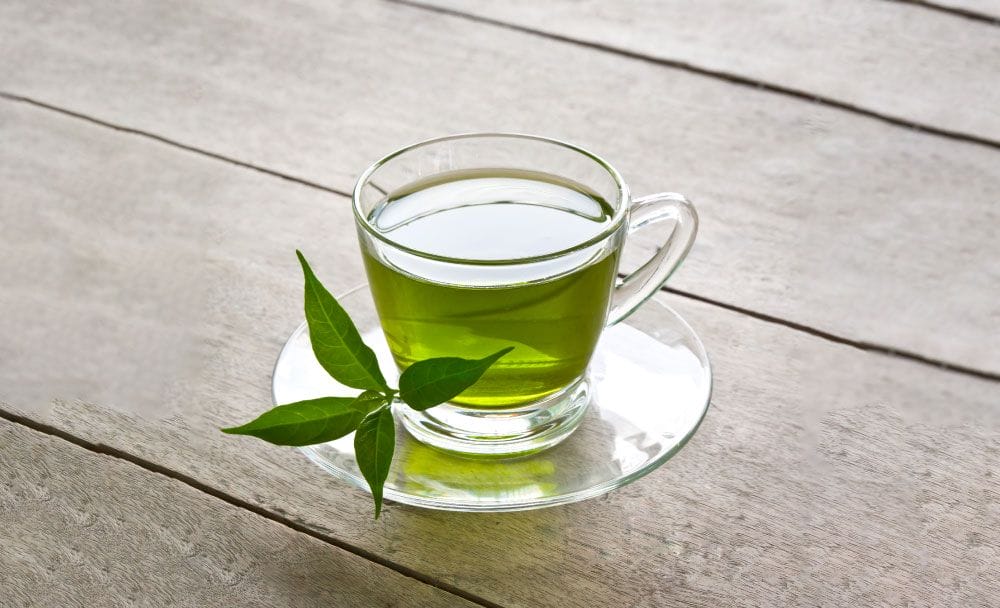Consuming green tea has not only become a popular trend in recent years but studies are also being conducted to show the various benefits of green tea.
Some of the green tea benefits include the prevention of cancer and cardiovascular diseases.[1] The anti-inflammatory, antiarthritic, antibacterial, antioxidative, antiviral, and cholesterol-lowering effects of green tea and isolated green tea constituents are under investigation.[1]
The health-promoting effects of green tea are mainly attributed to its polyphenol content, particularly flavanols which represent 30% of fresh leaf dry weight.[1]
In this blog, we will explore the 15 proven green tea benefits.
Health Benefits of Green Tea
The secret of green tea lies in the fact that it is rich in catechin, polyphenols, and particularly EGCG.
1. Anti-fungal effects
In humans, Hirasawa and Takada studied the antifungal activity of green tea catechins against Candida albicans and the convenience of a combined treatment with catechins and lower doses of antimycotics, which may help to avoid the side effects of antimycotics.[1]
Among catechins, pyrogallol catechin showed stronger anti-fungal activity against C.albicans than catechol catechin.[2]
2. Anti-viral effects
There is evidence that the polyphenols in green tea extract may act in a manner to protect against antiviral activity.[3]
EGCG and ECG in the green tea extract were found to be potent inhibitors of influenza virus replication in cell culture.[2] This effect was observed in all influenza virus sub-types tested.[2]
Quantitative analysis revealed that, at high concentrations, EGCG and ECG also suppressed viral RNA synthesis in cells.[2]
3. Antioxidant properties
Uses of green tea include consumption to reduce the risk of many chronic diseases. This beneficial effect has been attributed to the presence of high amounts of polyphenols, which are potent antioxidants.[1]
When using the oxygen radical absorbance capacity, green tea was found to have a greater antioxidant activity than Brussels sprouts, garlic, kale, and spinach.[2]
4. Anti-inflammatory properties
Uses of green tea ensure the management of iron overload and oxidative stress. This is attributed to the anti-inflammatory properties of green tea.[2] Green tea may also help to reduce inflammation associated with Crohn’s disease and ulcerative colitis.[2]
5. Improves Skin Health
Green tea benefits for skin are several. Treatment of green tea polyphenols on the skin has been shown to modulate the biochemical pathways involved in inflammatory responses, cell proliferation, and responses to chemical
tumor promoters. The polyphenols in green tea also modulate the ultraviolet light-induced inflammatory markers of skin inflammation.[2]
Research using pooled human skin cells to study the normal growth of the skin cells alone and comparing it to the growth of the cells when exposed to EGCG revealed that EGCG reactivated dying skin cells.[2]
6. Improves Oral Health
Researchers at the University of Chicago stated that polyphenols help inhibit the growth of bacteria that cause bad breath.[2] Green tea contains antibacterial and antiviral properties that help in preventing oral infections and cavities.
7. Boosts Immunity
A recent study appearing in the Journal of Allergy and Clinical Immunology stated that EGCG found in green tea can help to boost one’s immune system.[1] This property is attributed to its action against oxidants and radicals.[2]
8. Stress Reliever
Stress is well known to be one of the most important factors responsible for depressive disorders.[6]
Studies have shown that the polyphenol content in green tea helps reduce corticosterone and adrenocorticotropic hormone levels.[6] This in turn reduces the maladaptive responses to stress by inhibiting the hypothalamic-pituitary-adrenal axis.[6]
9. Weight Management
Green tea helps increase the body’s metabolic rates. With its thermogenic properties, green tea can also promote faster metabolism of fats and sugars.[2] Excess glucose found in the body is turned into fats by the hormone insulin. Because green tea has an inhibiting effect on insulin, it, therefore, helps keep sugar from being stored as fats. Instead, sends them directly into the muscles for immediate use.[2]
There are many preferences that people have when choosing which green tea is best for weight loss. It is recommended to take advice from a professional and choose the green tea best suited for you.
10. Cholesterol Reduction
Studies indicate that drinking green tea lowers total cholesterol levels. Further, green tea benefits also include improving the ratio of good cholesterol (HDL) to bad cholesterol (LDL).[2]
11. Improves Cognitive Function
A study in Japan showed that elderly Japanese people who consumed more than two cups of green tea a day had a 50% lower chance of having cognitive impairment, in comparison to those who drank other tested beverages.[2]
A cup of green tea contains between 15–50 mg of caffeine. Certain cognitive benefits are associated with caffeine consumption, such as a reduction in the likelihood of Parkinson’s disease.[2]
12. Regulates Blood Sugar Levels
There is also epidemiological evidence that drinking green tea may help prevent diabetes.[2]
Green tea has been used traditionally to control blood sugar in the body. Animal studies suggest that green tea may help prevent the development of type 1 diabetes and slow the progression once it has developed. EGCG has been found to increase insulin sensitivity and may repair damaged beta cells.[2]
High-performance liquid chromatography fractionation of tea extracts showed that the majority of the insulin-potentiating activity for green tea was due to EGCG.[2]
13. Improves Bone Health
Green tea benefits have also been associated with increased bone mineral density. It has been identified as an independent factor protecting against the risk of hip fractures. Studies have observed the positive effects of green tea extracts on the proliferation and activity of bone cells.[1]
14. Enhances Liver Function
The proliferation of hepatic stellate cells is closely related to the progression of liver fibrosis in chronic liver diseases, and EGCG has a potential inhibitory effect on the proliferation of these cells.[1]
15. Inhibits Abnormal Blood Clot Formation
Inhibition of abnormal blood clot formation takes on added importance when you consider that thrombosis (the formation of abnormal blood
clots) is the leading cause of heart attacks and strokes. Green tea inhibits the formation of abnormal blood clots and is effective in reducing platelet aggregation.[1][2][3] Any of these factors might be promising in reducing cardiovascular diseases.
Best Time to Drink Green Tea
The best time to drink green tea is in the morning as the caffeine content[2] in the green tea ensures better cognitive function. This ensures the day kick starts on the right note.
Studies have shown that another best time to drink green tea is during exercise. Components of catechins and caffeine in green tea have been shown to enhance fat oxidation. [4][5]
Green Tea Uses
What are the uses of Green Tea? Green tea may be used for the following purposes:
1. Green tea as a beverage
Starting your day with a cup of translucent green tea is a healthy way to start the day. Green tea is loaded with potent antioxidants, which can benefit your body in multiple ways. It can be a healthy substitute for coffee or any other tea counterparts.
2. Green tea as a hair rinse
Washing your hair with green tea removes all bacteria from your scalp and also calms an itchy scalp; therefore, it can be used as a hair rinse. This is one prominent green tea usage for hair care.
3. Green tea in face pack
Freshly brewed green tea may be used with other ingredients like honey and sandalwood powder to make an ideal face pack for oily skin. Green tea is an excellent natural cure for acne-prone skin.
4. Green tea as a wound wash
Green tea is excellent in scavenging free radicals and infection-causing bacteria from wounds. Therefore, it may be used as a wound cleanser or wool wash.
Green Tea Side Effects
While green tea is generally safe for consumption, excessive intake can lead to side effects. One of the main green tea side effects is insomnia.[2] It is recommended to limit the consumption of green tea to 2-3 cups per day.
FAQs about Green Tea
1. How does green tea ensure various health benefits?
Some of the green tea benefits include the prevention of cancer and cardiovascular diseases.[1] The anti-inflammatory, antiarthritic, antibacterial, antioxidative, antiviral, and cholesterol-lowering effects of green tea and isolated green tea constituents are under investigation.[1]
2. How does green tea help in weight loss?
Green tea helps increase the body’s metabolic rates. With its thermogenic properties, green tea can also promote faster metabolism of fats and sugars.[2] Excess glucose found in the body is turned into fats by the hormone insulin. Because green tea has an inhibiting effect on insulin, it, therefore, helps keep sugar from being stored as fats. Instead, sends them directly into the muscles for immediate use.[2]
3. Does green tea have antioxidant properties?
Uses of green tea include consumption to reduce the risk of many chronic diseases. This beneficial effect has been attributed to the presence of high amounts of polyphenols, which are potent antioxidants.[1]
When using the oxygen radical absorbance capacity, green tea was found to have a greater antioxidant activity than Brussels sprouts, garlic, kale, and spinach.[2]
4. What is the best time to drink green tea?
The best time to drink green tea is in the morning as the caffeine content[2] in the green tea ensures better cognitive function. This ensures the day kick starts on the right note.
Studies have shown that another best time to drink green tea is during exercise. Components of catechins and caffeine in green tea have been shown to enhance fat oxidation. [4] [5]
5. Does green tea have side effects?
While green tea is generally safe for consumption, excessive intake can lead to side effects. One of the main green tea side effects is insomnia.[2] It is recommended to limit the consumption of green tea to 2-3 cups per day.
Conclusion
In conclusion, the widespread consumption of green tea in various forms, combined with years of safe use and numerous studies supporting its health benefits, makes it a recommended beverage for regular consumption. Green tea has anti-inflammatory and antioxidant properties, which have been shown to benefit a variety of conditions such as cardiovascular diseases, oral cavity diseases, Parkinson’s disease, diabetes, exercise enhancement, inflammatory bowel disease, and skin disorders.
Disclaimer: The information mentioned here is for educational purposes only and is not intended to be an alternative to medical treatment by a medical practitioner. Please consult a professional medical practitioner before any dietary modifications.
References:
- Beneficial effects of green tea: A literature review
- Green tea: Health benefits
- Green Tea – an overview
- Matcha Green Tea Drinks Enhance Fat Oxidation During Brisk Walking in Females
- Green tea extract ingestion, fat oxidation, and glucose tolerance in healthy humans
- Green Tea, Coffee, and Caffeine Consumption Are Inversely Associated with Self-Report Lifetime Depression in the Korean Population























